QUT LWD101: Ethics, Law and Healthcare - Problem Solving Exercise
VerifiedAdded on 2022/09/22
|8
|1929
|21
Project
AI Summary
This assignment analyzes a healthcare case study involving ethical and legal considerations within the context of nursing practice. The paper identifies key healthcare principles, including autonomy, beneficence, non-maleficence, and justice, and applies them to a scenario involving patient care, medical errors, and adherence to patient wishes. The analysis examines the ethical and legal responsibilities of nurses, particularly RN Nguyen and RN Ben Bolton, and the hospital management, focusing on issues such as patient privacy, informed consent, and the consequences of medical negligence. The paper also explores the application of medical ethics concerning medical errors, decision-making, malpractice, and confidentiality. The analysis highlights the importance of accurate information gathering, professional conduct, and adherence to ethical codes and legal regulations in healthcare settings. The paper concludes with a discussion of the legal liabilities faced by the healthcare professionals and the hospital, emphasizing the need for ethical practices to ensure quality patient care and prevent harm.
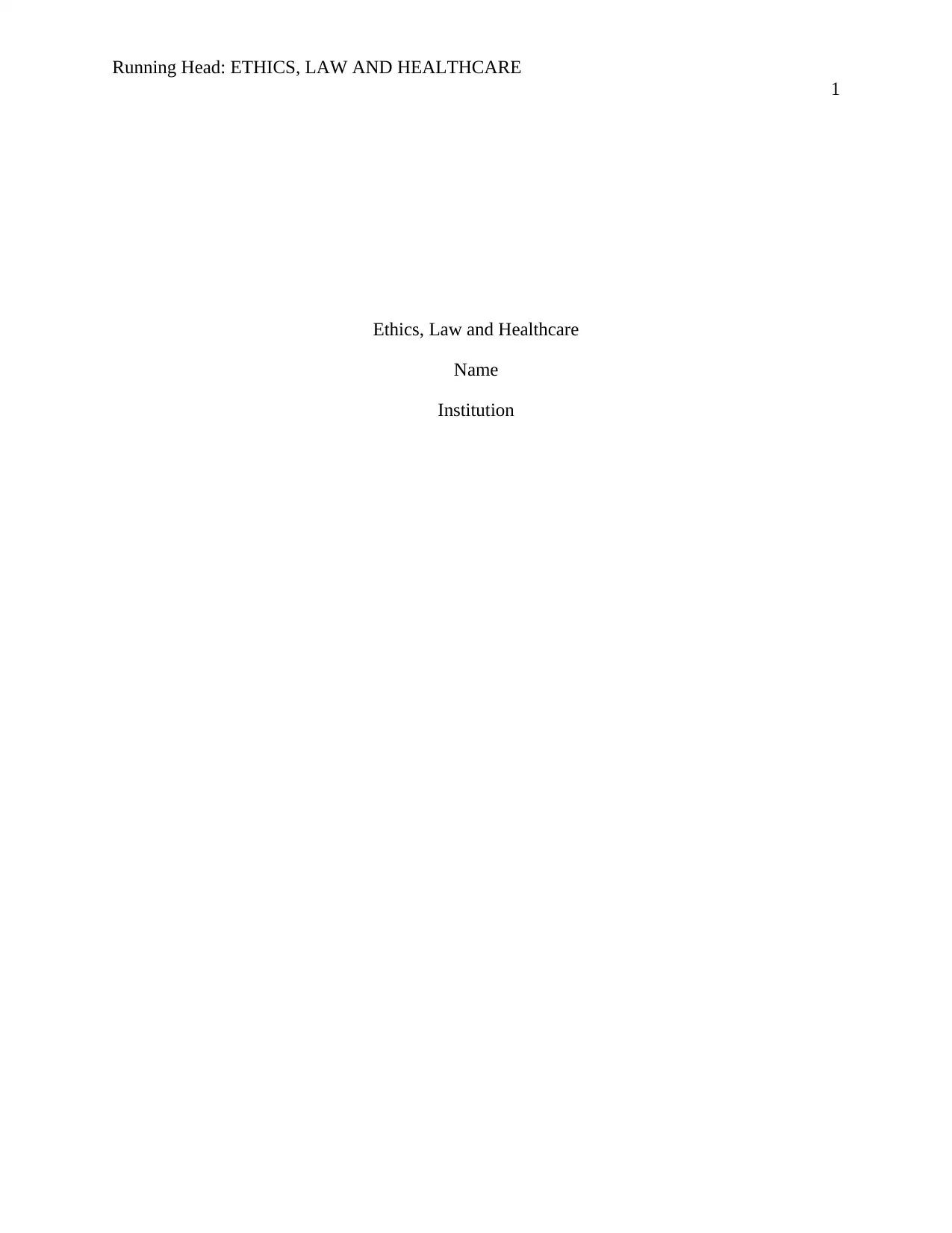
Running Head: ETHICS, LAW AND HEALTHCARE
1
Ethics, Law and Healthcare
Name
Institution
1
Ethics, Law and Healthcare
Name
Institution
Paraphrase This Document
Need a fresh take? Get an instant paraphrase of this document with our AI Paraphraser
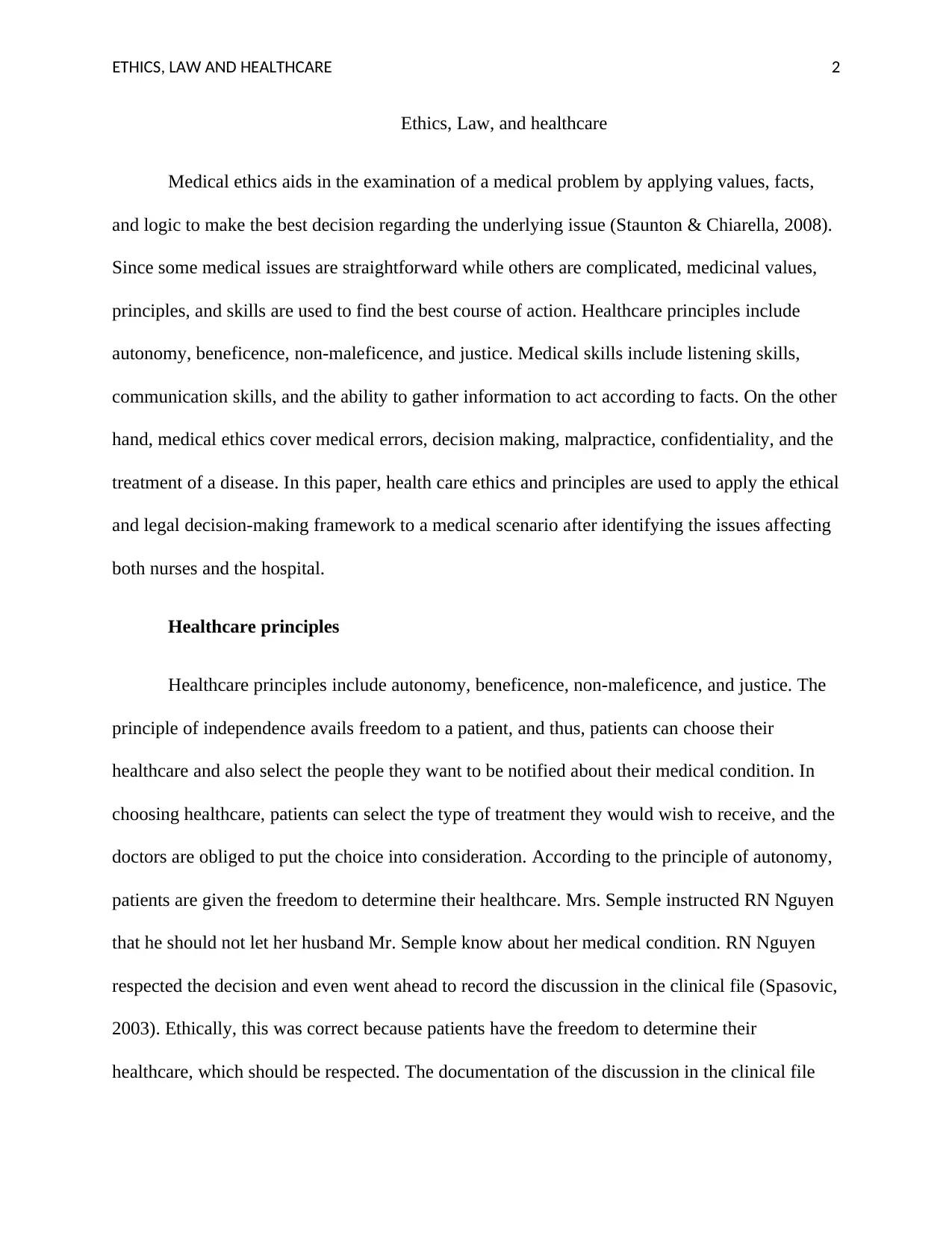
ETHICS, LAW AND HEALTHCARE 2
Ethics, Law, and healthcare
Medical ethics aids in the examination of a medical problem by applying values, facts,
and logic to make the best decision regarding the underlying issue (Staunton & Chiarella, 2008).
Since some medical issues are straightforward while others are complicated, medicinal values,
principles, and skills are used to find the best course of action. Healthcare principles include
autonomy, beneficence, non-maleficence, and justice. Medical skills include listening skills,
communication skills, and the ability to gather information to act according to facts. On the other
hand, medical ethics cover medical errors, decision making, malpractice, confidentiality, and the
treatment of a disease. In this paper, health care ethics and principles are used to apply the ethical
and legal decision-making framework to a medical scenario after identifying the issues affecting
both nurses and the hospital.
Healthcare principles
Healthcare principles include autonomy, beneficence, non-maleficence, and justice. The
principle of independence avails freedom to a patient, and thus, patients can choose their
healthcare and also select the people they want to be notified about their medical condition. In
choosing healthcare, patients can select the type of treatment they would wish to receive, and the
doctors are obliged to put the choice into consideration. According to the principle of autonomy,
patients are given the freedom to determine their healthcare. Mrs. Semple instructed RN Nguyen
that he should not let her husband Mr. Semple know about her medical condition. RN Nguyen
respected the decision and even went ahead to record the discussion in the clinical file (Spasovic,
2003). Ethically, this was correct because patients have the freedom to determine their
healthcare, which should be respected. The documentation of the discussion in the clinical file
Ethics, Law, and healthcare
Medical ethics aids in the examination of a medical problem by applying values, facts,
and logic to make the best decision regarding the underlying issue (Staunton & Chiarella, 2008).
Since some medical issues are straightforward while others are complicated, medicinal values,
principles, and skills are used to find the best course of action. Healthcare principles include
autonomy, beneficence, non-maleficence, and justice. Medical skills include listening skills,
communication skills, and the ability to gather information to act according to facts. On the other
hand, medical ethics cover medical errors, decision making, malpractice, confidentiality, and the
treatment of a disease. In this paper, health care ethics and principles are used to apply the ethical
and legal decision-making framework to a medical scenario after identifying the issues affecting
both nurses and the hospital.
Healthcare principles
Healthcare principles include autonomy, beneficence, non-maleficence, and justice. The
principle of independence avails freedom to a patient, and thus, patients can choose their
healthcare and also select the people they want to be notified about their medical condition. In
choosing healthcare, patients can select the type of treatment they would wish to receive, and the
doctors are obliged to put the choice into consideration. According to the principle of autonomy,
patients are given the freedom to determine their healthcare. Mrs. Semple instructed RN Nguyen
that he should not let her husband Mr. Semple know about her medical condition. RN Nguyen
respected the decision and even went ahead to record the discussion in the clinical file (Spasovic,
2003). Ethically, this was correct because patients have the freedom to determine their
healthcare, which should be respected. The documentation of the discussion in the clinical file
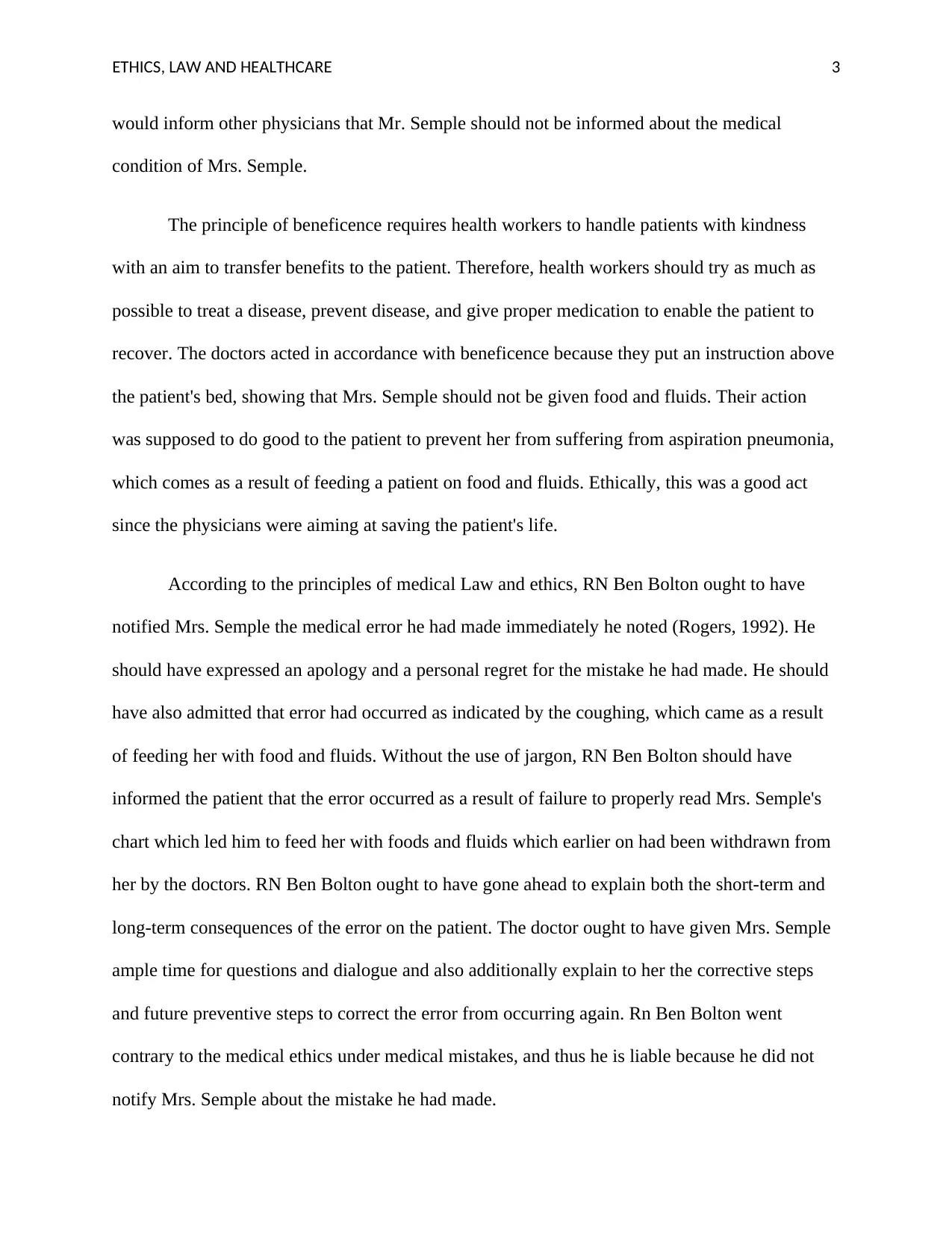
ETHICS, LAW AND HEALTHCARE 3
would inform other physicians that Mr. Semple should not be informed about the medical
condition of Mrs. Semple.
The principle of beneficence requires health workers to handle patients with kindness
with an aim to transfer benefits to the patient. Therefore, health workers should try as much as
possible to treat a disease, prevent disease, and give proper medication to enable the patient to
recover. The doctors acted in accordance with beneficence because they put an instruction above
the patient's bed, showing that Mrs. Semple should not be given food and fluids. Their action
was supposed to do good to the patient to prevent her from suffering from aspiration pneumonia,
which comes as a result of feeding a patient on food and fluids. Ethically, this was a good act
since the physicians were aiming at saving the patient's life.
According to the principles of medical Law and ethics, RN Ben Bolton ought to have
notified Mrs. Semple the medical error he had made immediately he noted (Rogers, 1992). He
should have expressed an apology and a personal regret for the mistake he had made. He should
have also admitted that error had occurred as indicated by the coughing, which came as a result
of feeding her with food and fluids. Without the use of jargon, RN Ben Bolton should have
informed the patient that the error occurred as a result of failure to properly read Mrs. Semple's
chart which led him to feed her with foods and fluids which earlier on had been withdrawn from
her by the doctors. RN Ben Bolton ought to have gone ahead to explain both the short-term and
long-term consequences of the error on the patient. The doctor ought to have given Mrs. Semple
ample time for questions and dialogue and also additionally explain to her the corrective steps
and future preventive steps to correct the error from occurring again. Rn Ben Bolton went
contrary to the medical ethics under medical mistakes, and thus he is liable because he did not
notify Mrs. Semple about the mistake he had made.
would inform other physicians that Mr. Semple should not be informed about the medical
condition of Mrs. Semple.
The principle of beneficence requires health workers to handle patients with kindness
with an aim to transfer benefits to the patient. Therefore, health workers should try as much as
possible to treat a disease, prevent disease, and give proper medication to enable the patient to
recover. The doctors acted in accordance with beneficence because they put an instruction above
the patient's bed, showing that Mrs. Semple should not be given food and fluids. Their action
was supposed to do good to the patient to prevent her from suffering from aspiration pneumonia,
which comes as a result of feeding a patient on food and fluids. Ethically, this was a good act
since the physicians were aiming at saving the patient's life.
According to the principles of medical Law and ethics, RN Ben Bolton ought to have
notified Mrs. Semple the medical error he had made immediately he noted (Rogers, 1992). He
should have expressed an apology and a personal regret for the mistake he had made. He should
have also admitted that error had occurred as indicated by the coughing, which came as a result
of feeding her with food and fluids. Without the use of jargon, RN Ben Bolton should have
informed the patient that the error occurred as a result of failure to properly read Mrs. Semple's
chart which led him to feed her with foods and fluids which earlier on had been withdrawn from
her by the doctors. RN Ben Bolton ought to have gone ahead to explain both the short-term and
long-term consequences of the error on the patient. The doctor ought to have given Mrs. Semple
ample time for questions and dialogue and also additionally explain to her the corrective steps
and future preventive steps to correct the error from occurring again. Rn Ben Bolton went
contrary to the medical ethics under medical mistakes, and thus he is liable because he did not
notify Mrs. Semple about the mistake he had made.
⊘ This is a preview!⊘
Do you want full access?
Subscribe today to unlock all pages.

Trusted by 1+ million students worldwide
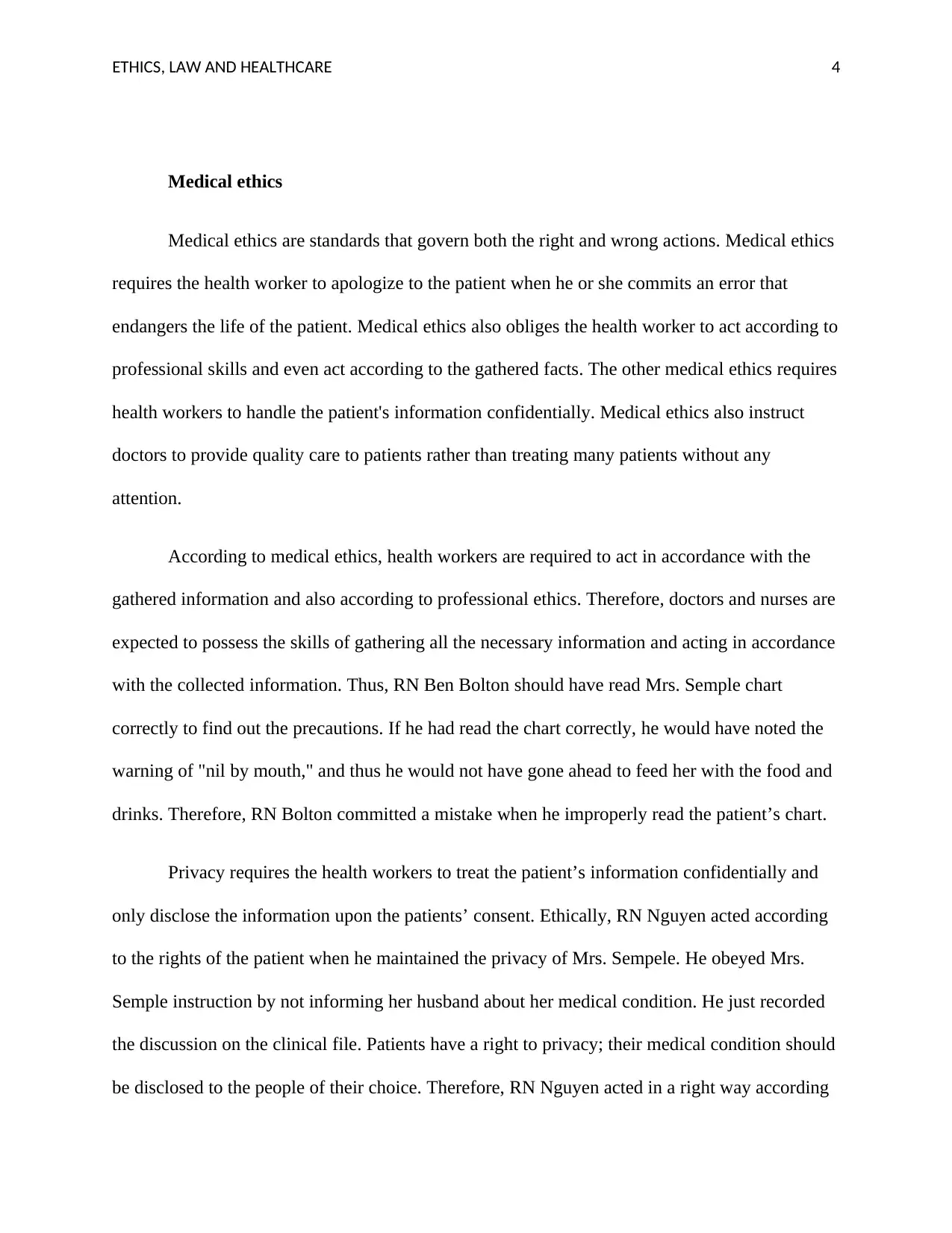
ETHICS, LAW AND HEALTHCARE 4
Medical ethics
Medical ethics are standards that govern both the right and wrong actions. Medical ethics
requires the health worker to apologize to the patient when he or she commits an error that
endangers the life of the patient. Medical ethics also obliges the health worker to act according to
professional skills and even act according to the gathered facts. The other medical ethics requires
health workers to handle the patient's information confidentially. Medical ethics also instruct
doctors to provide quality care to patients rather than treating many patients without any
attention.
According to medical ethics, health workers are required to act in accordance with the
gathered information and also according to professional ethics. Therefore, doctors and nurses are
expected to possess the skills of gathering all the necessary information and acting in accordance
with the collected information. Thus, RN Ben Bolton should have read Mrs. Semple chart
correctly to find out the precautions. If he had read the chart correctly, he would have noted the
warning of "nil by mouth," and thus he would not have gone ahead to feed her with the food and
drinks. Therefore, RN Bolton committed a mistake when he improperly read the patient’s chart.
Privacy requires the health workers to treat the patient’s information confidentially and
only disclose the information upon the patients’ consent. Ethically, RN Nguyen acted according
to the rights of the patient when he maintained the privacy of Mrs. Sempele. He obeyed Mrs.
Semple instruction by not informing her husband about her medical condition. He just recorded
the discussion on the clinical file. Patients have a right to privacy; their medical condition should
be disclosed to the people of their choice. Therefore, RN Nguyen acted in a right way according
Medical ethics
Medical ethics are standards that govern both the right and wrong actions. Medical ethics
requires the health worker to apologize to the patient when he or she commits an error that
endangers the life of the patient. Medical ethics also obliges the health worker to act according to
professional skills and even act according to the gathered facts. The other medical ethics requires
health workers to handle the patient's information confidentially. Medical ethics also instruct
doctors to provide quality care to patients rather than treating many patients without any
attention.
According to medical ethics, health workers are required to act in accordance with the
gathered information and also according to professional ethics. Therefore, doctors and nurses are
expected to possess the skills of gathering all the necessary information and acting in accordance
with the collected information. Thus, RN Ben Bolton should have read Mrs. Semple chart
correctly to find out the precautions. If he had read the chart correctly, he would have noted the
warning of "nil by mouth," and thus he would not have gone ahead to feed her with the food and
drinks. Therefore, RN Bolton committed a mistake when he improperly read the patient’s chart.
Privacy requires the health workers to treat the patient’s information confidentially and
only disclose the information upon the patients’ consent. Ethically, RN Nguyen acted according
to the rights of the patient when he maintained the privacy of Mrs. Sempele. He obeyed Mrs.
Semple instruction by not informing her husband about her medical condition. He just recorded
the discussion on the clinical file. Patients have a right to privacy; their medical condition should
be disclosed to the people of their choice. Therefore, RN Nguyen acted in a right way according
Paraphrase This Document
Need a fresh take? Get an instant paraphrase of this document with our AI Paraphraser
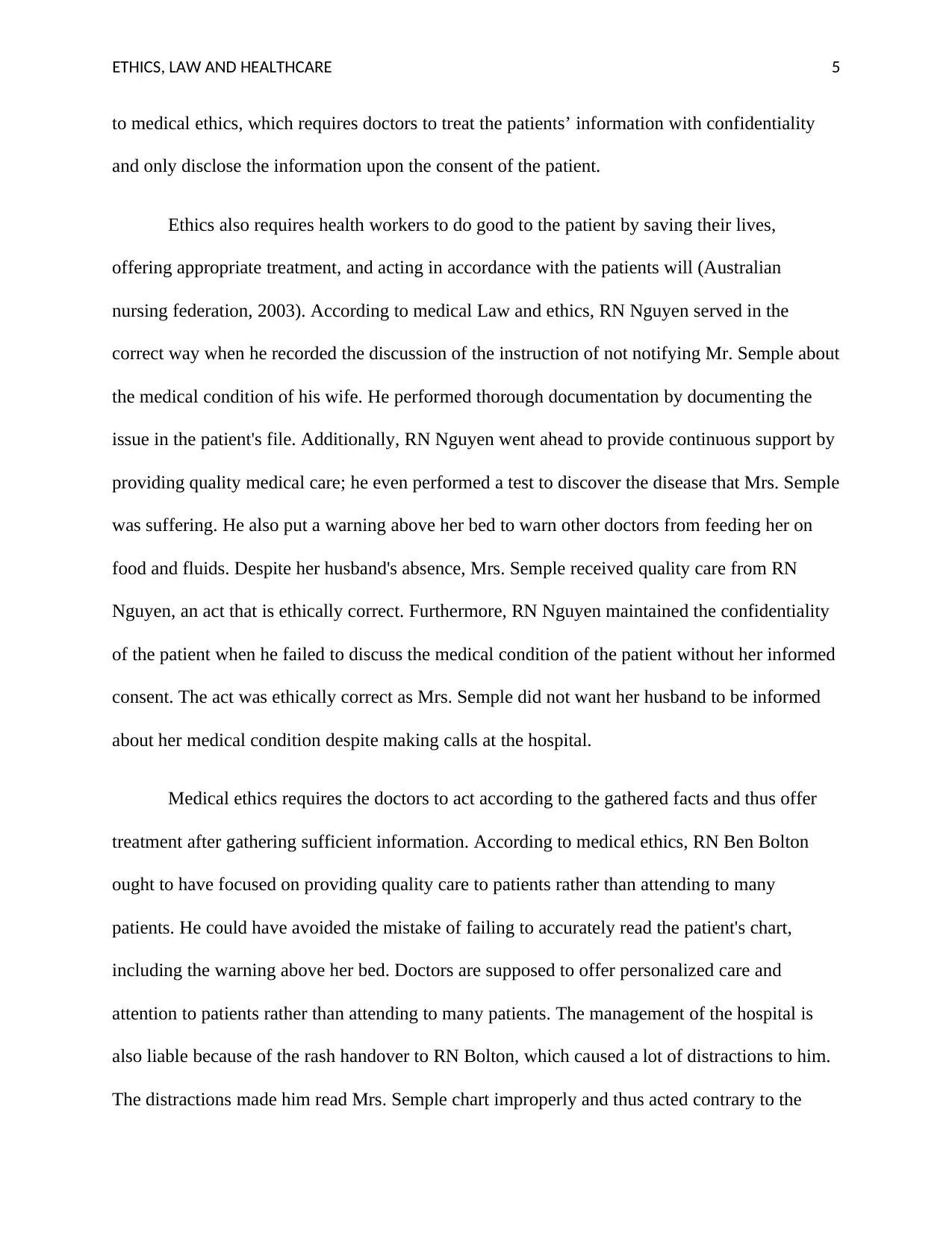
ETHICS, LAW AND HEALTHCARE 5
to medical ethics, which requires doctors to treat the patients’ information with confidentiality
and only disclose the information upon the consent of the patient.
Ethics also requires health workers to do good to the patient by saving their lives,
offering appropriate treatment, and acting in accordance with the patients will (Australian
nursing federation, 2003). According to medical Law and ethics, RN Nguyen served in the
correct way when he recorded the discussion of the instruction of not notifying Mr. Semple about
the medical condition of his wife. He performed thorough documentation by documenting the
issue in the patient's file. Additionally, RN Nguyen went ahead to provide continuous support by
providing quality medical care; he even performed a test to discover the disease that Mrs. Semple
was suffering. He also put a warning above her bed to warn other doctors from feeding her on
food and fluids. Despite her husband's absence, Mrs. Semple received quality care from RN
Nguyen, an act that is ethically correct. Furthermore, RN Nguyen maintained the confidentiality
of the patient when he failed to discuss the medical condition of the patient without her informed
consent. The act was ethically correct as Mrs. Semple did not want her husband to be informed
about her medical condition despite making calls at the hospital.
Medical ethics requires the doctors to act according to the gathered facts and thus offer
treatment after gathering sufficient information. According to medical ethics, RN Ben Bolton
ought to have focused on providing quality care to patients rather than attending to many
patients. He could have avoided the mistake of failing to accurately read the patient's chart,
including the warning above her bed. Doctors are supposed to offer personalized care and
attention to patients rather than attending to many patients. The management of the hospital is
also liable because of the rash handover to RN Bolton, which caused a lot of distractions to him.
The distractions made him read Mrs. Semple chart improperly and thus acted contrary to the
to medical ethics, which requires doctors to treat the patients’ information with confidentiality
and only disclose the information upon the consent of the patient.
Ethics also requires health workers to do good to the patient by saving their lives,
offering appropriate treatment, and acting in accordance with the patients will (Australian
nursing federation, 2003). According to medical Law and ethics, RN Nguyen served in the
correct way when he recorded the discussion of the instruction of not notifying Mr. Semple about
the medical condition of his wife. He performed thorough documentation by documenting the
issue in the patient's file. Additionally, RN Nguyen went ahead to provide continuous support by
providing quality medical care; he even performed a test to discover the disease that Mrs. Semple
was suffering. He also put a warning above her bed to warn other doctors from feeding her on
food and fluids. Despite her husband's absence, Mrs. Semple received quality care from RN
Nguyen, an act that is ethically correct. Furthermore, RN Nguyen maintained the confidentiality
of the patient when he failed to discuss the medical condition of the patient without her informed
consent. The act was ethically correct as Mrs. Semple did not want her husband to be informed
about her medical condition despite making calls at the hospital.
Medical ethics requires the doctors to act according to the gathered facts and thus offer
treatment after gathering sufficient information. According to medical ethics, RN Ben Bolton
ought to have focused on providing quality care to patients rather than attending to many
patients. He could have avoided the mistake of failing to accurately read the patient's chart,
including the warning above her bed. Doctors are supposed to offer personalized care and
attention to patients rather than attending to many patients. The management of the hospital is
also liable because of the rash handover to RN Bolton, which caused a lot of distractions to him.
The distractions made him read Mrs. Semple chart improperly and thus acted contrary to the
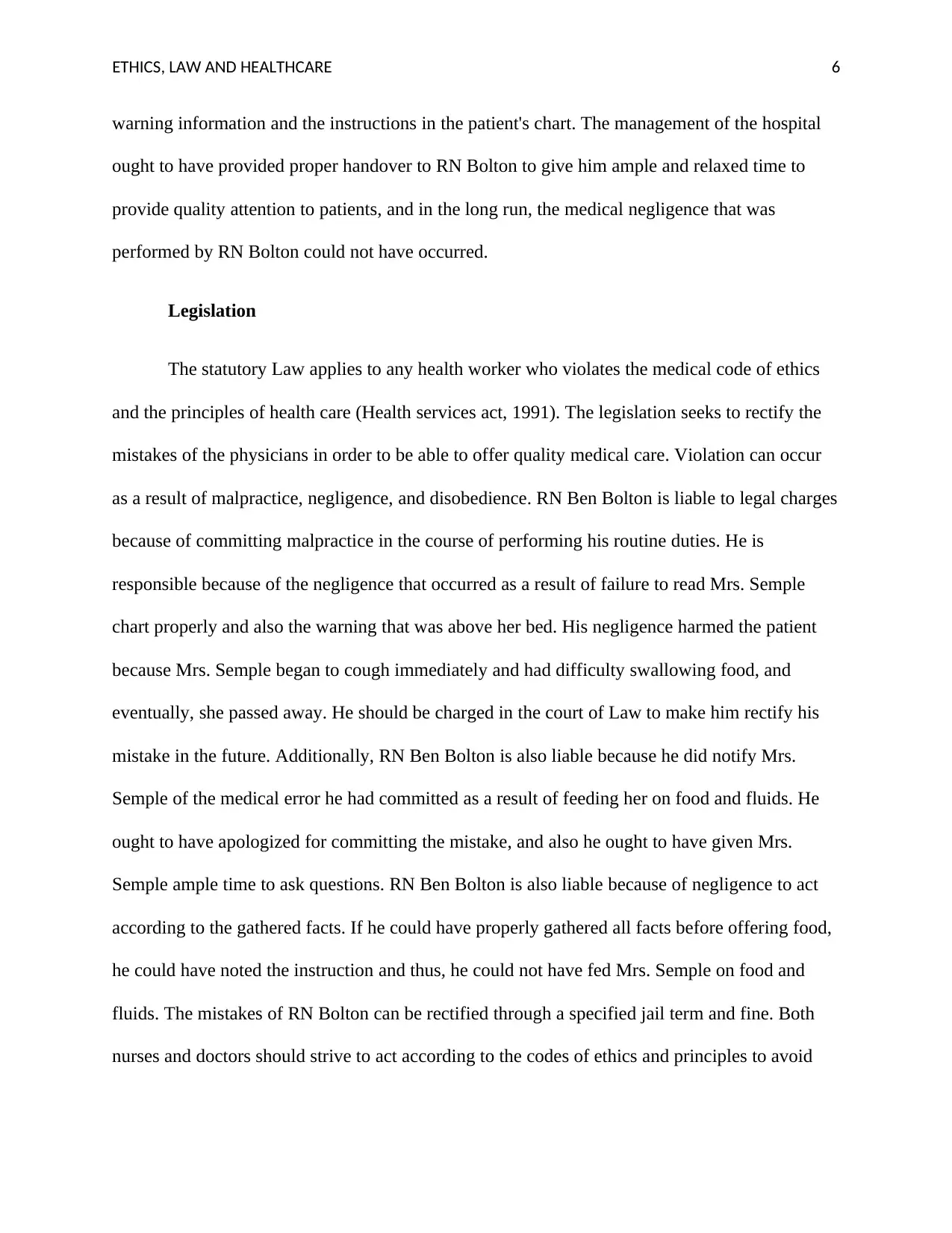
ETHICS, LAW AND HEALTHCARE 6
warning information and the instructions in the patient's chart. The management of the hospital
ought to have provided proper handover to RN Bolton to give him ample and relaxed time to
provide quality attention to patients, and in the long run, the medical negligence that was
performed by RN Bolton could not have occurred.
Legislation
The statutory Law applies to any health worker who violates the medical code of ethics
and the principles of health care (Health services act, 1991). The legislation seeks to rectify the
mistakes of the physicians in order to be able to offer quality medical care. Violation can occur
as a result of malpractice, negligence, and disobedience. RN Ben Bolton is liable to legal charges
because of committing malpractice in the course of performing his routine duties. He is
responsible because of the negligence that occurred as a result of failure to read Mrs. Semple
chart properly and also the warning that was above her bed. His negligence harmed the patient
because Mrs. Semple began to cough immediately and had difficulty swallowing food, and
eventually, she passed away. He should be charged in the court of Law to make him rectify his
mistake in the future. Additionally, RN Ben Bolton is also liable because he did notify Mrs.
Semple of the medical error he had committed as a result of feeding her on food and fluids. He
ought to have apologized for committing the mistake, and also he ought to have given Mrs.
Semple ample time to ask questions. RN Ben Bolton is also liable because of negligence to act
according to the gathered facts. If he could have properly gathered all facts before offering food,
he could have noted the instruction and thus, he could not have fed Mrs. Semple on food and
fluids. The mistakes of RN Bolton can be rectified through a specified jail term and fine. Both
nurses and doctors should strive to act according to the codes of ethics and principles to avoid
warning information and the instructions in the patient's chart. The management of the hospital
ought to have provided proper handover to RN Bolton to give him ample and relaxed time to
provide quality attention to patients, and in the long run, the medical negligence that was
performed by RN Bolton could not have occurred.
Legislation
The statutory Law applies to any health worker who violates the medical code of ethics
and the principles of health care (Health services act, 1991). The legislation seeks to rectify the
mistakes of the physicians in order to be able to offer quality medical care. Violation can occur
as a result of malpractice, negligence, and disobedience. RN Ben Bolton is liable to legal charges
because of committing malpractice in the course of performing his routine duties. He is
responsible because of the negligence that occurred as a result of failure to read Mrs. Semple
chart properly and also the warning that was above her bed. His negligence harmed the patient
because Mrs. Semple began to cough immediately and had difficulty swallowing food, and
eventually, she passed away. He should be charged in the court of Law to make him rectify his
mistake in the future. Additionally, RN Ben Bolton is also liable because he did notify Mrs.
Semple of the medical error he had committed as a result of feeding her on food and fluids. He
ought to have apologized for committing the mistake, and also he ought to have given Mrs.
Semple ample time to ask questions. RN Ben Bolton is also liable because of negligence to act
according to the gathered facts. If he could have properly gathered all facts before offering food,
he could have noted the instruction and thus, he could not have fed Mrs. Semple on food and
fluids. The mistakes of RN Bolton can be rectified through a specified jail term and fine. Both
nurses and doctors should strive to act according to the codes of ethics and principles to avoid
⊘ This is a preview!⊘
Do you want full access?
Subscribe today to unlock all pages.

Trusted by 1+ million students worldwide
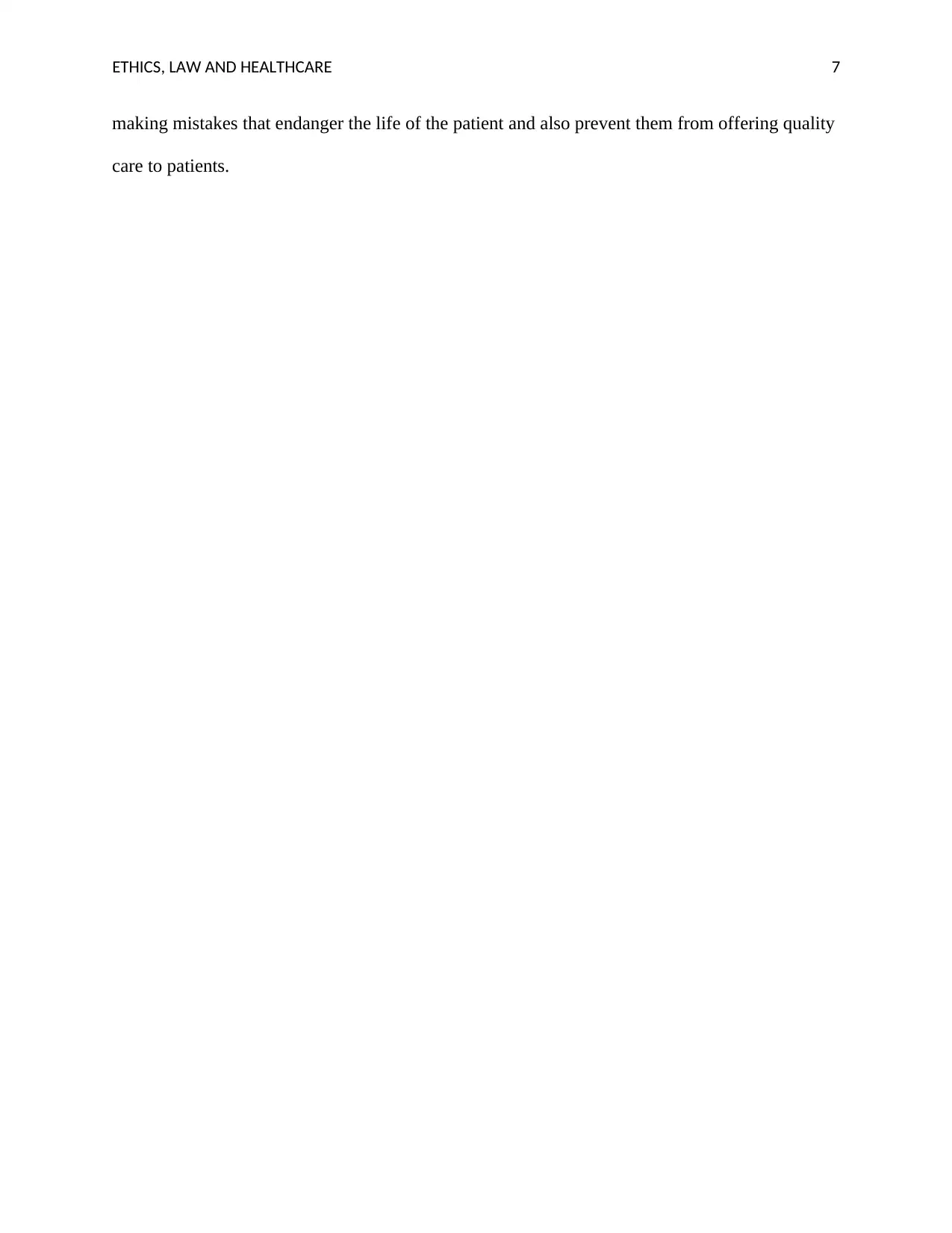
ETHICS, LAW AND HEALTHCARE 7
making mistakes that endanger the life of the patient and also prevent them from offering quality
care to patients.
making mistakes that endanger the life of the patient and also prevent them from offering quality
care to patients.
Paraphrase This Document
Need a fresh take? Get an instant paraphrase of this document with our AI Paraphraser
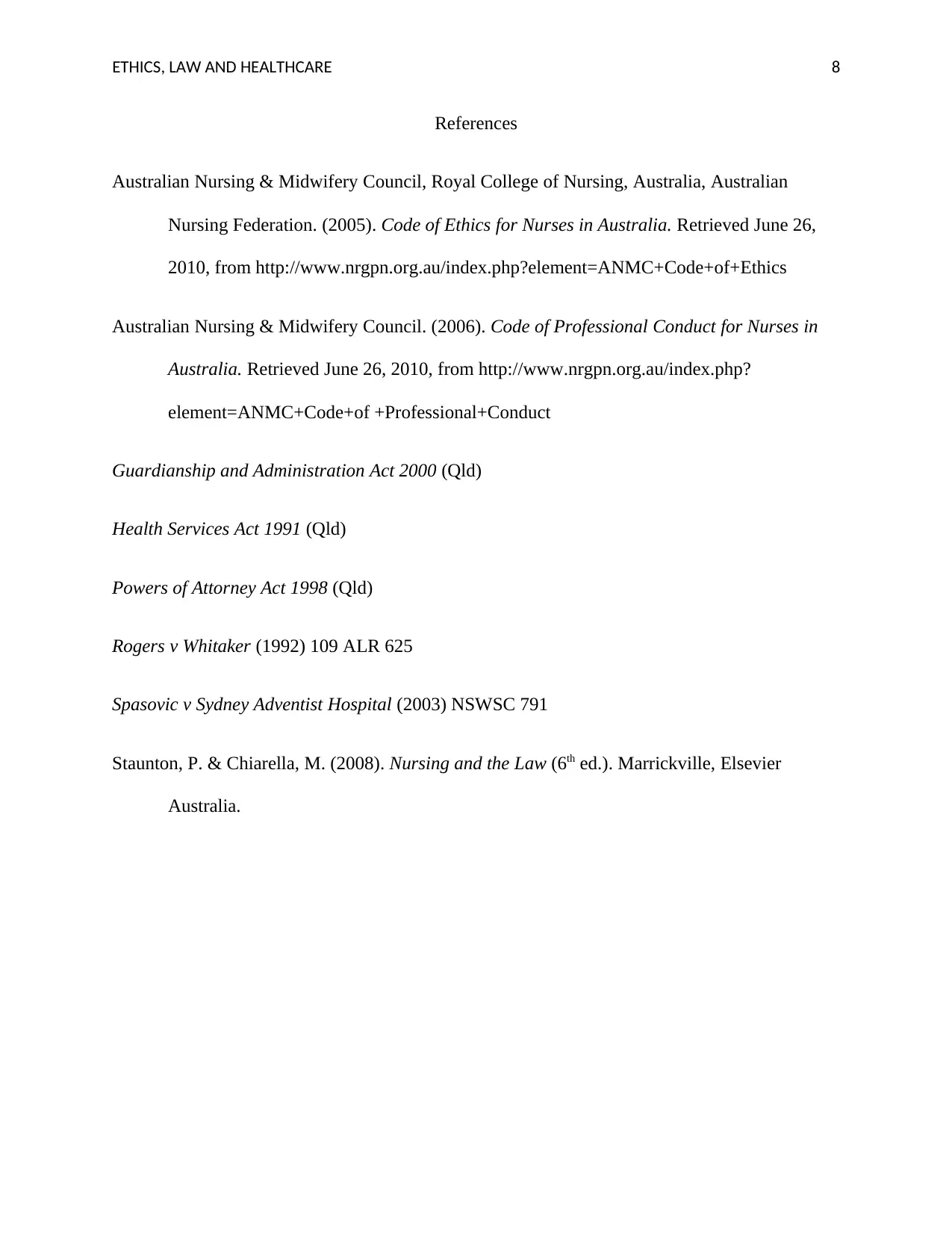
ETHICS, LAW AND HEALTHCARE 8
References
Australian Nursing & Midwifery Council, Royal College of Nursing, Australia, Australian
Nursing Federation. (2005). Code of Ethics for Nurses in Australia. Retrieved June 26,
2010, from http://www.nrgpn.org.au/index.php?element=ANMC+Code+of+Ethics
Australian Nursing & Midwifery Council. (2006). Code of Professional Conduct for Nurses in
Australia. Retrieved June 26, 2010, from http://www.nrgpn.org.au/index.php?
element=ANMC+Code+of +Professional+Conduct
Guardianship and Administration Act 2000 (Qld)
Health Services Act 1991 (Qld)
Powers of Attorney Act 1998 (Qld)
Rogers v Whitaker (1992) 109 ALR 625
Spasovic v Sydney Adventist Hospital (2003) NSWSC 791
Staunton, P. & Chiarella, M. (2008). Nursing and the Law (6th ed.). Marrickville, Elsevier
Australia.
References
Australian Nursing & Midwifery Council, Royal College of Nursing, Australia, Australian
Nursing Federation. (2005). Code of Ethics for Nurses in Australia. Retrieved June 26,
2010, from http://www.nrgpn.org.au/index.php?element=ANMC+Code+of+Ethics
Australian Nursing & Midwifery Council. (2006). Code of Professional Conduct for Nurses in
Australia. Retrieved June 26, 2010, from http://www.nrgpn.org.au/index.php?
element=ANMC+Code+of +Professional+Conduct
Guardianship and Administration Act 2000 (Qld)
Health Services Act 1991 (Qld)
Powers of Attorney Act 1998 (Qld)
Rogers v Whitaker (1992) 109 ALR 625
Spasovic v Sydney Adventist Hospital (2003) NSWSC 791
Staunton, P. & Chiarella, M. (2008). Nursing and the Law (6th ed.). Marrickville, Elsevier
Australia.
1 out of 8
Related Documents
Your All-in-One AI-Powered Toolkit for Academic Success.
+13062052269
info@desklib.com
Available 24*7 on WhatsApp / Email
![[object Object]](/_next/static/media/star-bottom.7253800d.svg)
Unlock your academic potential
Copyright © 2020–2026 A2Z Services. All Rights Reserved. Developed and managed by ZUCOL.





